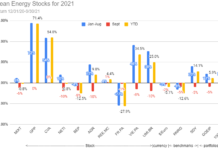The U.S. Environmental Protection Agency has agreed to review the recently enacted MATS Rule – Mercury & Air Toxics Standards that went into effect at the end of 2011. At least two dozen states and forty utility companies have filed suit against the EPA over the rule, which is intended to cap mercury and other toxic emissions as well as particulates. The rules particularly impact power plants that use coal-fired boilers to generate electricity. The EPA provides an interactive map to see where these plants are located. They are predominantly in the eastern half of the country.
Existing plants have three years to comply. Industry and power generators should find it child’s play given that the EPA has been in the business of setting emissions standards for decades and it appears industry and power generators have for the most part been compliant. By most accounts emissions standards have been effective in cleaning up the skies over the U.S. In the years between 1980 and 2008, sodium dioxide and nitrogen oxide emissions from industry have been cut by 57% and from power generators by 40%. The reduction in emissions by power generators is all the more remarkable given that electricity use in the U.S. increased by 85% during the same period and the use of coal has tripled.
MATS is the EPA’s first attempt to reduce mercury emissions. Mercury seeps into the water supply and the food chain through fish. It can cause nervous system damage and is a particular threat for children and pregnant women. The EPS estimated that the $9.6 billion estimated cost for compliance could be justified by an estimated $90 billion annual savings in healthcare costs.
However, the hue and cry over MATS is the most shrill in history. At least four companies with new plants on the drawing board have joined the lawsuits: White Stallion Energy Center, LLC; Tenaska Trailblazer Partners, LLC (owned by Tenaska, Inc. and Arch Coal (ACI: NYSE); the Deseret Power Electric Cooperative; and the Tri-State Generation and Transmission Association. The power industry is complaining that new plants in the cue for construction are not able to comply with MATS as the standards are written today. Most likely, any technological impediments can be overcome with adequate investment. I am suspicious the added expenditures would change the economics of these new plants to the point that construction financing could be in jeopardy.
Economists have a term – cost shifting. Put simply it means that the costs of a good or service are moved from the person who incurred the cost to another person who is ostensibly in a better position to pay. Health insurance is often cited as an example where the costs of healthcare are moved from the shoulders of the person who incurred the doctor bill to the insurance company. However, this is a contractually agreed upon arrangement and the sick person has already paid the insurance company a premium to assuming the obligation.
Polluters shift costs also. There is no doubt that there is a cost to be borne for toxic emissions. If left unchecked, toxic emissions exact a price from everyone in the community. The public pays for the cost of pollution with poor health and high medical bills. Yet unlike the contractual arrangement between the insured person and the insurance company, there is no formal agreement with the public to assume the costs of pollution. It is imposed upon them by lobbyists and lawyers who attempt to block standards that would focus responsibility for pollution on the source.
Southern Company (SO: NYSE), an electricity generator and wholesaler, has been in the forefront of opposition to EPA standards. Southern Company reportedly spent over $17.5 million lobbying Congress in between the years 2010 and 2012. Among other arguments, Southern supported proposals to disapprove and delay compliance schedules with MATS, as well as to delay the EPA from setting carbon pollution standards. Southern is among a number of power generators that belong to the American Coalition for Clean Coal Electricity.
No one wants to see promising investment projects go awry. No one likes to feel the long arm of government regulation. Certainly no one wants to see their utility bill increase. Nonetheless, it is time that polluters stop shifting responsibility to innocent bystanders and pass the costs of emissions to those who benefit from their businesses – investors and customers. It is time to comply with regulations and begin emissions abatement.
Debra Fiakas is the Managing Director of Crystal Equity Research, an alternative research resource on small capitalization companies in selected industries.
Neither the author of the Small Cap Strategist web log, Crystal Equity Research nor its affiliates have a beneficial interest in the companies mentioned herein. VNDM is included in Crystal Equity Research’s The Mothers of Invention Index.









